For three decades it was billed as a European Union for the Gulf, an alliance of brotherly Arab monarchies that would one day have a single currency and even political unity.
But yesterday, the region’s two leading princes, the ambitious and strong-willed leaders of Saudi Arabia and the United Arab Emirates, put a final nail in the coffin of the Gulf Co-operation Council (GCC), which has been torn apart by rows over Iran, Islamism and the Arab Spring.
Crown Prince Mohammed bin Salman of Saudi Arabia and his older ally, Crown Prince Mohammed bin Zayed of Abu Dhabi, launched their own two-country joint committee to promote their hardline stance on the region’s crises. The Saudi-Emirati Co-ordination Council formalises the already close relationship between the princes. The two have forged a partnership, leading a military alliance to back the recognised government of Yemen in its civil war, supporting President Trump’s hostility to the Iran nuclear deal and isolating Qatar.
The launch of the new council, with media fanfare in both countries, comes on the first anniversary of the blockade on Qatar, in which they were joined by Bahrain and Egypt but not by Oman or Kuwait. The GCC was made up of those two countries, along with Saudi Arabia, the UAE, Bahrain and Qatar.
The GCC, set up in 1981, had grand plans ten years ago, with a joint currency, free trade and common political positions on the table, all anchored in a common loyalty to the US and the West, whose military might ensured their survival. Those plans faltered with the Arab Spring and clashes over how to respond to the Iran nuclear deal. Oman played a key role in facilitating the deal but Saudi Arabia and the UAE opposed it.
The single currency disappeared from the agenda. Proposals to expand the GCC to include Jordan and Morocco, regional monarchies close to Saudi Arabia, were also quietly dropped.
The formation of the two-country council is being widely interpreted as bringing an end to the GCC’s ambitions and also as a response to what the two princes see as the unreliable politics of their western allies. They particularly came to distrust President Obama, with his thinly veiled contempt for their autocracies and his determination to bring Iran in from the cold.
The GCC cannot function while two of its members refuse to talk to a third — even to the extent of opening borders or airspace — and Qatar cannot be expelled without its agreement.
Kuwait and Oman have remained resolutely neutral in that dispute, offering their services as mediators. However, the UAE and Saudi Arabia are determined to press ahead with their more aggressive vision, especially as they see the Trump administration as unusually supportive.
...[ Continue to next page ]
Share This Post















